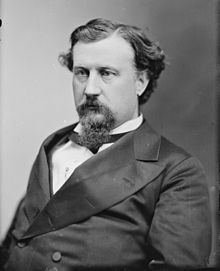George Eliphaz Spencer (November 1, 1836 – February 19, 1893) was an American politician and a U.S. senator from the state of Alabama who also served as an officer in the Union Army during the American Civil War.
George E. Spencer | |
|---|---|
 | |
| United States Senator from Alabama | |
| In office July 13, 1868 – March 3, 1879 | |
| Preceded by | Benjamin Fitzpatrick |
| Succeeded by | George S. Houston |
| Personal details | |
| Born | November 1, 1836 Champion, New York |
| Died | February 19, 1893 (aged 56) Washington, D.C. |
| Citizenship | United States of America |
| Political party | Republican |
| Spouses | |
| Profession | Attorney politician rancher miner |
| Military service | |
| Allegiance | United States of America |
| Branch/service | Union Army |
| Rank | |
| Commands | 1st Alabama Cavalry Regiment |
| Battles/wars | American Civil War |
Biography edit
Born in Champion, New York, Spencer was the son of Gordon Percival and Deborah Mallory Spencer. He educated at Montreal College in Canada. After relocating to Iowa he engaged in the study of law. During the Pike's Peak Gold Rush he briefly relocated to Colorado where in November 1859 he founded the town of Breckenridge. He married English author Bella Zilfa in 1862.[1]
Career edit
During the American Civil War, Spencer enlisted as a captain on October 16, 1862. While serving on the staff of Brig. Gen. Grenville M. Dodge, he requested a transfer to the 1st Alabama Cavalry Regiment, a volunteer regiment made up of Southern Unionists, which did not have a permanent commander. Receiving a promotion to colonel, he led the regiment from September 11, 1863, until his resignation on July 5, 1865.[2]
After the war, Spencer returned to Alabama to practice law. His wife died of typhoid fever in 1867. For a time he served as register in bankruptcy for the fourth district of Alabama.[3]
Elected as a Republican to the United States Senate upon readmission of Alabama to the Union, Spencer served from July 13, 1868, to March 3, 1879.[4] The Ku Klux Klan and their supporters accused him of corruption and rewarding supporters in the legislature with patronage positions, allegations which he denied.[5][6]
He was appointed a commissioner of the Union Pacific Railroad with help from his previous leader, Major General Dodge. In 1877, he married prominent actress May Nunez, the niece and namesake of one-armed Confederate General William Wing Loring (May's given names at birth were "William Wing").[7] The couple then spent two years on a ranch in Nevada tending to mining interests before settling in Washington, D.C., about 1880.[8]
Death edit
Spencer died in Washington, D.C., on February 19, 1893 (age 56 years, 110 days). He is interred at Arlington National Cemetery, Arlington, Virginia.[9]
References edit
- ^ "George Eliphaz Spencer". 1st Alabama Cavalry. Archived from the original on 13 December 2013. Retrieved 2 July 2013.
- ^ "George Eliphaz Spencer". Arlington National Cemetery. Retrieved 2 July 2013.
- ^ "George Eliphaz Spencer". Biographical Directory of the United States Congress. Retrieved 2 July 2013.
- ^ "George Eliphaz Spencer". Govtrack US Congress. Retrieved 2 July 2013.
- ^ Spencer, George Eliphaz (1875). "Report of the Joint Committee of the General Assembly of Alabama: In Regard to the Alleged Election of Geo. E. Spencer, as U. S. Senator, Together with Memorial and Evidence".
- ^ Fitzgerald, Michael W. (1998). "Republican Factionalism and Black Empowerment: The Spencer-Warner Controversy and Alabama Reconstruction, 1868-1880". The Journal of Southern History. 64 (3): 473–494. doi:10.2307/2587791. JSTOR 2587791.
- ^ "Actress, Author, Wife: The Story of May Nunez". The Tennessean. Nashville, Tennessee. November 29, 1886. p. 2. Retrieved November 6, 2023 – via newspapers.com.
- ^ "George Eliphaz Spencer". Encyclopedia of Alabama. Retrieved 2 July 2013.
- ^ "George Eliphaz Spencer". The Political Graveyard. Retrieved 2 July 2013.
External links edit
- United States Congress. "George E. Spencer (id: S000723)". Biographical Directory of the United States Congress.
- George E. Spencer at Find a Grave